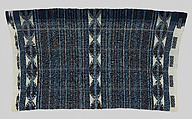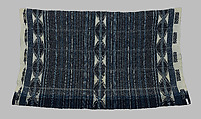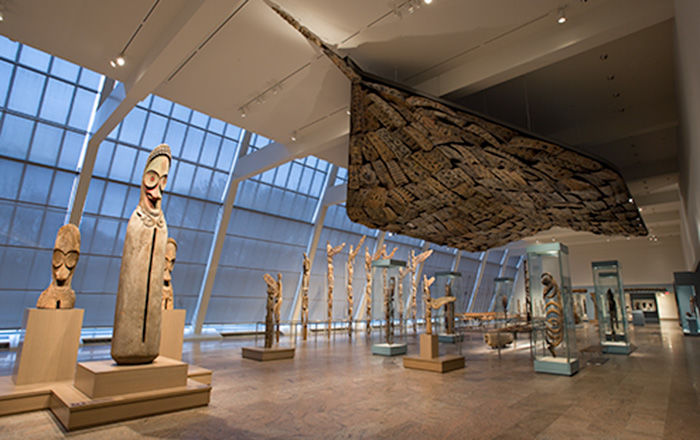Woman's Royal Prestige Wrapper (Elegheghe dudu)
Obamadesara Nigerian
Not on view
During the mid-twentieth century, there were only a few male weavers in the Nigerian town of Owo. One of them, Obamadesara, has been credited with the creation of a genre of prestige over-wrapper known as Elegheghe, worn by women in Owo royal households.
This master weaver was a Yoruba prince native of Owo. He is recognized for his innovative style of weaving which he presumably developed while travelling across Nigeria during a period of exile imposed by the colonial authorities. According to oral accounts, he produced his rather small corpus of some fifteen textiles between the time of his return to Owo in 1930 and his death in 1956.
Distinctive is the creation of motifs using a tapestry weave technique -- a technique most unusual in this region of West Africa. In this tapestry weave example, each band features a lizard motif at one end and an interlaced rectangle at the other. Obamadesara's daughter suggested that because of its intricacy, he was not able to teach the design to any apprentice. No longer produced, Elegheghe became prestigious heirlooms.
A photograph published in Robin Poynor's 1980 article on Owo cloths illustrates how such Elegheghe were worn. Positioned as outer-wrappers over the waist, atop a blue and white striped wrapper, it is adjusted so that the lizard patterns can be seen at front. Poynor further distinguished two styles of Elegheghe: one with a dyed red band, known as Elegheghe pupa, and the other with a dark band, known as Elegheghe dudu. This example probably belongs to the latter category.
Due to rights restrictions, this image cannot be enlarged, viewed at full screen, or downloaded.
This artwork is meant to be viewed from right to left. Scroll left to view more.











